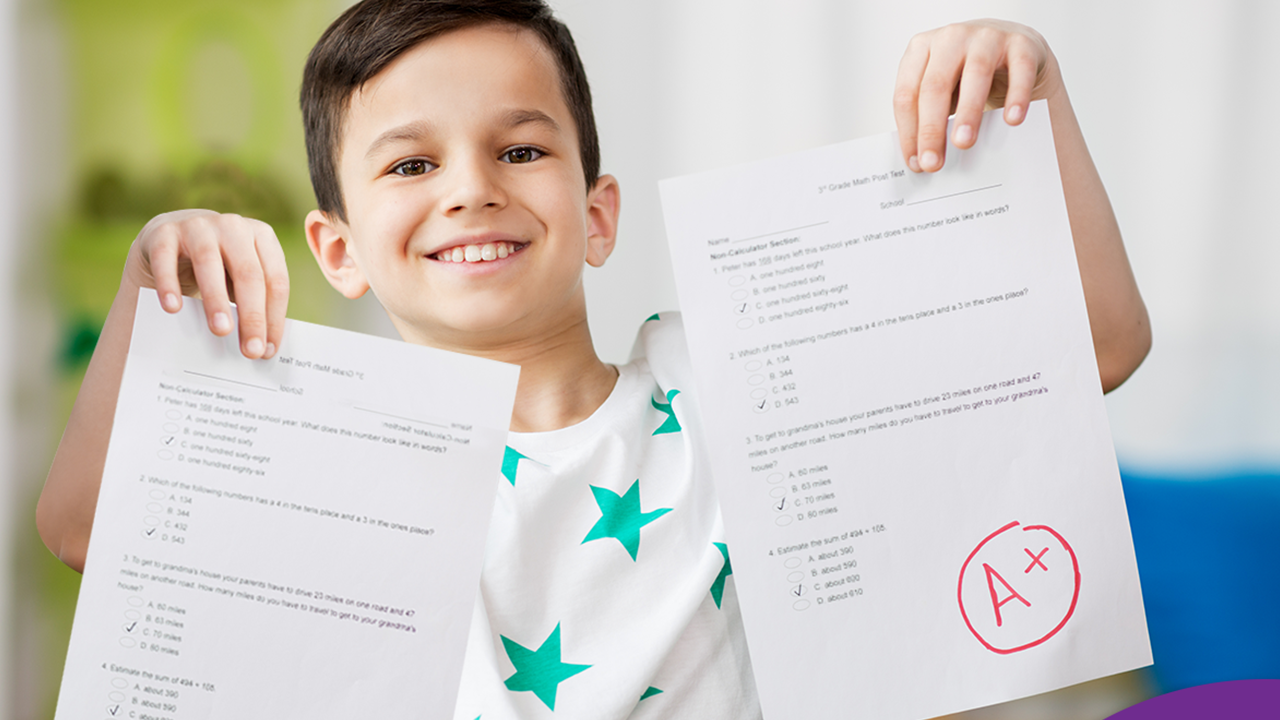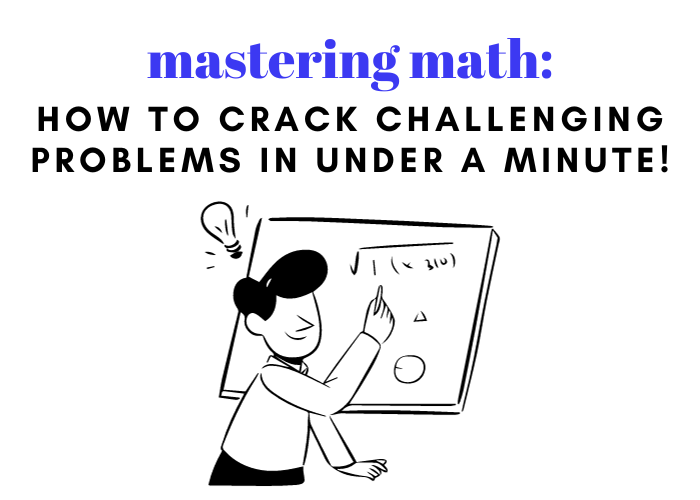

Last Updated on May 29, 2022
There are two ways children can study: the “hard way” and the “smart way.”
But what’s the difference?
Studying the “hard way” means studying for long periods of time, reading and rereading text, underlining and highlighting, cramming, and single-minded repetition. These sound like typical study habits, right?
Well, there’s a catch. On the surface, these habits may create the illusion of mastery, but ultimately they result in superficial knowledge. Research shows that children who use these study “methods” don’t get results that are nearly as good as those who study the “smart way.”
Have you noticed that, more often than not, top students usually aren’t only crushing it in one subject but are actually crushing it across the board? This kind of well-rounded success is no coincidence. A review of multiple studies reported in the Journal of Perspectives on Psychological Science shows that great academic performance usually boils down to 3 factors: the student’s study habits, skills, and attitude.
In fact, these studies concluded that it was possible to accurately predict the degree of improvement in a child’s cognitive abilities and academic performance based on whether they had the following 5 success habits:
When kids learn these 5 success habits, they work smarter, not harder. They get more done in less time. They go beyond superficial learning and gain real knowledge and skills. And they become problem solvers and achievers for life.
So what exactly are these habits?
1. Goal Setting
When we want to achieve something, whether it’s getting in shape, building a successful business, or getting an A in a class, the first thing we usually do is set a goal.
But what makes the difference between success and failure?
In his #1 New York Times best-selling book, “Atomic Habits,” author James Clear writes that after years of setting goals and failing again and again, he realized that his results had very little to do with the goals he set and more to do with the systems he followed.
For example, let’s say your goal is to learn how to play a difficult song on the piano. Your system includes how often you practice, how well you receive and act on feedback from your teacher, and how you handle tough sections as you go.
Now, let’s say you’re a young student who wants to get a few A’s on your report card. That’s your goal. Your system is how well you manage your time, how organized you are, how you prioritize, how you tackle challenging topics or problems, and how you handle feedback from your teachers and tutors.
What Clear’s observations tell us is that people who are phenomenal at goal setting are not just setting a goal and defining steps: they are putting intelligent systems in place.
While the end goal remains in mind, they focus on the specific actions they need to take every day to achieve that goal. So while we think achievement is about changing our results, it’s really about changing the systems we use to get those results.
In order for your child to do well in school, especially in the long term, they need the right system. Work on the system and you maximize the chances of achieving the goal!
2. Time Management
According to a study on the connection between sports and academic performance from the University of Missouri, student-athletes do better in school than non-athletes. In this study, athletes at the school had significantly higher GPAs than non-athletes; while the athletes had an average GPA of 3.28, the non-athletes had an average GPA of only 2.98.
Why would this be?
The reason is most likely because student-athletes have had to master the art of time management. In between long practices, weekend tournaments, and stressful game days, the time they have to study is limited.
So, in order to manage all that’s on their plate AND get good grades, they need some pretty impressive time management skills. But time management isn’t just about carving out enough time to complete a task – it’s the ability to make the most of the time spent on that task.
Countless studies have shown that highly successful students actually spend less time studying than their peers do – they just study more effectively. They study “smart,” not “hard.” Your child doesn’t need to study for 20 hours a week in order to get superb grades; they can study far less, as long as it’s consistent and focused and free from distractions like TV or social media.
3. Prioritization
Imagine this: You have an important report to complete for work by the end of the day, 10 emails to respond to, and a proposal to write for next week. What do you work on first? You probably work on the important report due that day.
Why? Because you are skilled in the art of prioritization. Now imagine you get a phone call: your child is sick at school and needs to be picked up. Now what’s at the top of your priority list? When you have more than one urgent task to get to, the ability to prioritize helps you decide which to tackle first.
Once we’re adults, prioritization becomes second nature because we’ve lived out the consequences of failure to complete important tasks on time all too often. Since they usually haven’t had those kinds of experiences, children often struggle to prioritize.
Prioritization is one of the executive functions, the set of “mental behaviors” we use every day to learn, work, and manage daily life.
Executive function skills are crucial in helping us plan, focus, remember, and juggle multiple tasks successfully. Trouble with executive functions can mean trouble focusing, following directions, and handling emotions. And that also means trouble achieving goals.
When children improve their executive function skills, they gain the ability to cut through the clutter and zero in on the truly critical details. Whether to plan an essay, select which information to include in notes, or evaluate word problems in math for the most relevant data, children with advanced executive function do better. They know how to weed out what doesn’t matter, select the most important information, and maintain the list of priorities as they progress.
And they become experts at managing tasks by moving what really matters to the top of the priority list and pushing what’s less important down to the bottom. This means they use their time effectively, for what really matters, and that translates to better results in school and in life.
4. Organization
If your child frequently loses assignments, misplaces completed work, or has difficulty planning for tests, they may lack organizational skills. In the short term, it might not seem like such a big deal, but the long-term consequences can be dire. Why? Because organizational skills are crucial for achieving just about anything.
Can organizational skills be learned? Absolutely!
In a study conducted by School Psychology Quarterly on improving the academic performance of children with ADHD, 37 children were randomly assigned to receive an 8-week crash course in organization skills.
At the end of the 8 weeks, the children’s homework management skills and abilities to plan for tests and keep track of their assignments went through the roof. And when tested after another 8 weeks, they’d maintained those skills. Feedback from teachers improved, GPAs went up, and parents reported that their kids had fewer problems with homework.
Why are organizational skills so important? Because children who can plan and organize can use their time, attention, and energy efficiently and effectively to achieve any goal they put their minds to.
5. Grit
When facing a challenge, kids can fall into a rut we call the “Learning Pit.” It looks a bit like this:
When children hit stage 4, most give up. After all, when confused and overwhelmed, what do we do? We quit. But some children don’t. Why? Because they’ve got grit.
For your child to develop grit, their response to failure must change. Rather than seeing “failure” as the end, they see those First Attempts In Learning as part of the process. When this happens, children don’t feel stressed or ashamed when they stumble or make mistakes because they know that not getting it right is one of the steps on the road to mastery.
We could think of grit as passionate perseverance. Why is it so important? Because a student with less talent can catch up in skill by applying effort. And that same student can blast past other students by applying the same skill over time with more effort. In fact, grit has been shown to be a reliable predictor of better learning outcomes!
Psychology professor Angela Duckworth and author of the book “Grit: The Power of Passion and Perseverance” argues that grit is the hallmark of high achievers. According to her research, a quantitative measure of grit could reliably predict which children would make it to the finals in spelling bees and their GPAs.
Her research also shows that kids can learn grit. If your child develops grit, they won’t just study “smart,” they’ll also be able to face any kind of challenge and constantly bounce back from hurdles that get in their way.
5 Habits for Exponential Gains
When children learn these 5 habits, great things happen. Together, they can lead to exponential gains in performance. But even better, students with these habits are less stressed, more confident, and better prepared for the challenges of life.
So what could your child achieve with these 5 secret success habits?


